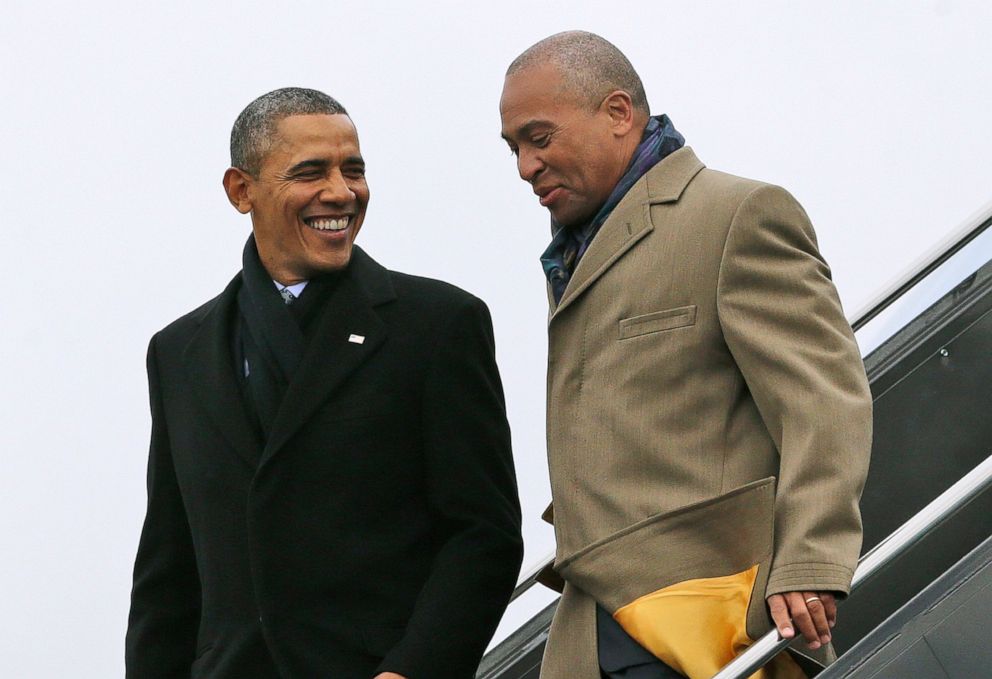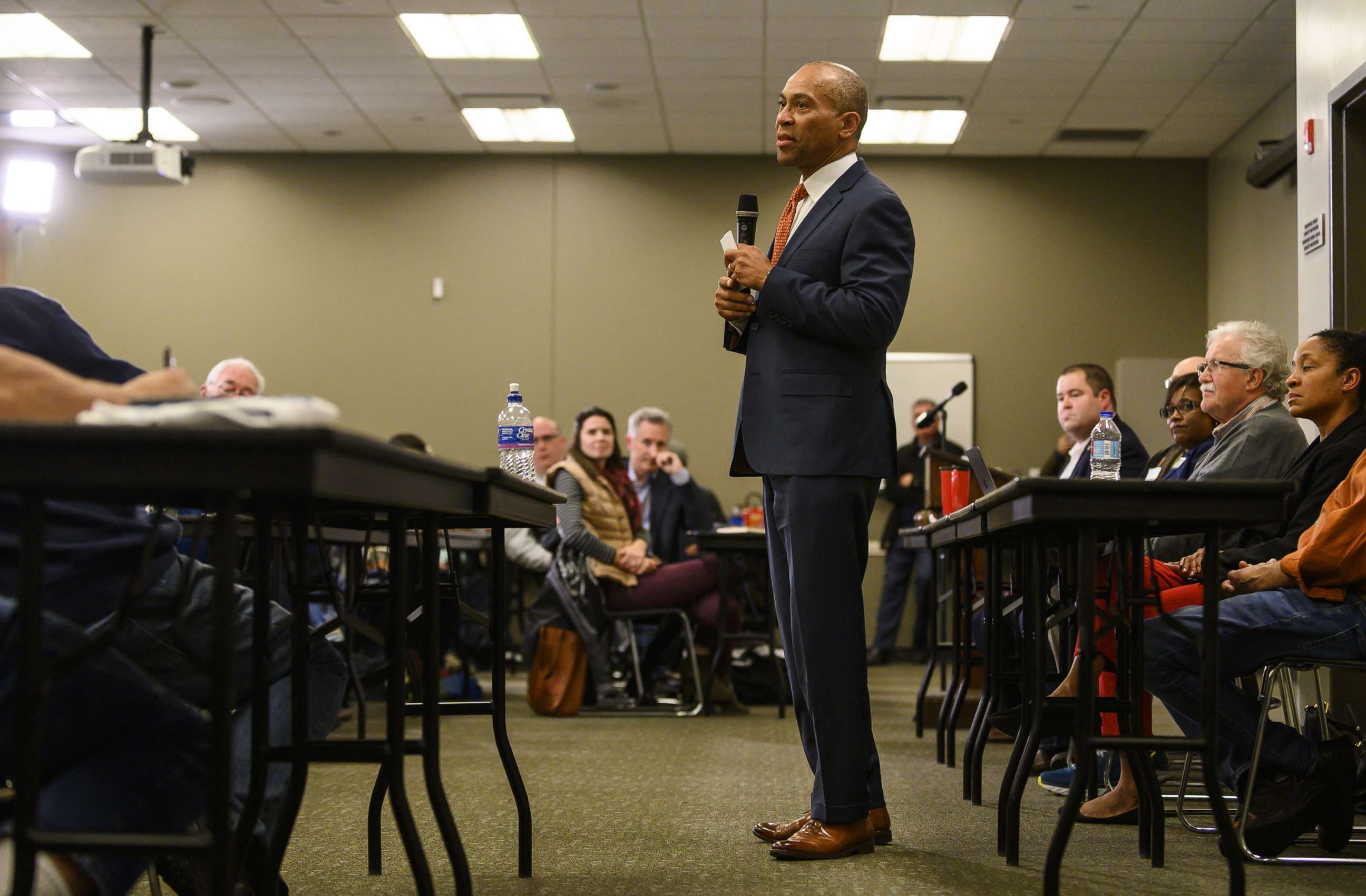Deval Patrick: Everything you need to know about the 2020 presidential candidate
He was the first African American elected to be Massachusetts governor.
In a sharp reversal from his 2018 decision to not pursue a presidential run, former two-term Massachusetts Gov. Deval Patrick formally entered the 2020 race on Nov. 14 -- with less than three months before the first votes were cast. A close ally of former President Barack Obama, Patrick says he seeks to position himself as an alternative choice for voters who are unsatisfied with the other candidates and someone who can unify the party without tearing others down.
Out of the running: The day after the New Hampshire primary, Patrick suspended his campaign. He said the vote, "was not enough for us to create the practical wind at the campaign’s back to go on to the next round of voting. So I have decided to suspend the campaign, effective immediately," he wrote supporters on Wednesday.

Name: Deval Patrick
Party: Democrat
Date of birth: July 31, 1956
Age: 63
Hometown: Chicago
Family: Patrick and his wife, Diane, have two adult daughters, Katherine and Sarah, and one grandson.
Education: Patrick graduated cum laude from Harvard University with a Bachelor of Arts degree in English and American literature in 1978. He returned to Harvard for Law School and earned his Juris Doctor, again with cum laude honors, in 1982.
What he does now: Prior to making his announcement, Patrick served as managing director at Bain Capital, a private equity firm -- notably co-founded by Sen. Mitt Romney, R-Utah -- and he was a political contributor for CBS News.
What he used to do: Patrick worked at Bain Capital from 2015-2019. He served as governor of Massachusetts from 2007-2015. Prior to holding Massachusetts' top office, he served on the board of directors of ACC Capital Holdings from 2004-2006, as an executive vice president at Coca-Cola from 2001-2004 and as general counsel at Texaco from 1999-2001. Under the Clinton administration, he was appointed assistant U.S. attorney for the civil rights division from 1994-1997.

Key life/career moments:
Patrick was raised by his mother and grandparents on the South Side of Chicago after his father, a jazz musician, left the family for New York. In the eighth grade, Patrick received a scholarship to Milton Academy, an elite private school outside of Boston. He went on to study at Harvard University, where he later returned for law school and served as president of the Harvard Legal Aid Bureau.
After earning his law degree, Patrick practiced with the NAACP Legal Defense and Educational Fund and later joined the Boston law firm, Hill & Barlow, P.C., where he was named a partner by the age of 34. In 1994, then-President Bill Clinton appointed him as the U.S. assistant attorney general for the civil rights division of the Department of Justice.
In 2007, Patrick became the first black man elected governor of Massachusetts. During his two-term governorship, he passed a $13 billion transportation overhaul, won a $4 billion federal education grant, signed $1 billion in tax increases into law, helped stop a constitutional amendment that would have banned gay marriage and planned the introduction of casinos to the state. Under Patrick's leadership, Massachusetts also joined the Regional Greenhouse Gas Initiative and became a leader in biofuel production.
After winning a tough reelection bid in 2010, Patrick announced he would not seek a third term. Patrick then joined Bain Capital, and last year, he joined CBS as a political contributor to provide commentary on the Democratic primary race. Patrick resigned from both roles in November after announcing his own candidacy.
Where he stands on some issues:
Patrick has aimed to position himself as a moderate among a large field of progressive candidates.
When Patrick announced his candidacy on "CBS This Morning," he said that he supports a public option in the Affordable Care Act but is against "Medicare for All." He said he aims to vastly reduce student debt but with "other strategies that we've heard," and points to how as Massachusetts governor, he outlined a 10-year education proposal that included universal prekindergarten and free community college.
The Bain Capital alum told ABC News that he's against a wealth tax, saying, "Wealth to me is not the problem. It's greed."
Patrick said he sides with former Vice President Joe Biden and Sen. Amy Klobuchar, D-Minn., opposing the repeal of Section 1325 of immigration law, which would make illegal border crossings a civil offense rather than a criminal one.
He also said on ABC News' "Powerhouse Politics" podcast that his administration would overhaul mandatory minimum sentencing laws.
Fundraising:
A few days after joining the race, Patrick said that he would accept money from super PACs, an avenue that other 2020 Democratic presidential candidates have publicly denounced.
"I'm not crazy about super PAC money either ... I think we need to do some catch-up," he said. "If there is going to be super PAC money that supports me, the sources of that should be fully disclosed."
Although Patrick's 2020 campaign hasn't yet released fundraising numbers, he raised more than $38 million in contributions in his two successful bids for governor, according to the National Institute on Money in Politics.
What you might not know about him:
Patrick applied to Harvard Law School from Sudan, as he was there working with the United Nations under a Rockefeller Scholarship.
A portion of Wabash Avenue on Chicago's South Side was renamed "Deval Patrick Way" in 2013.
Patrick says he planned to announce his 2020 candidacy two weeks before Thanksgiving last year -- until his wife was diagnosed with uterine cancer and had to undergo surgery. At the time, he cited the "cruelty of our elections process" in his choice not to run. But now -- one year later -- he said his wife is cancer-free and has encouraged him to run, helping prompt Patrick to join the presidential primary race in the 11th-hour.



